Third Iranian Fuel Shipment For Hezbollah Reaches Syria
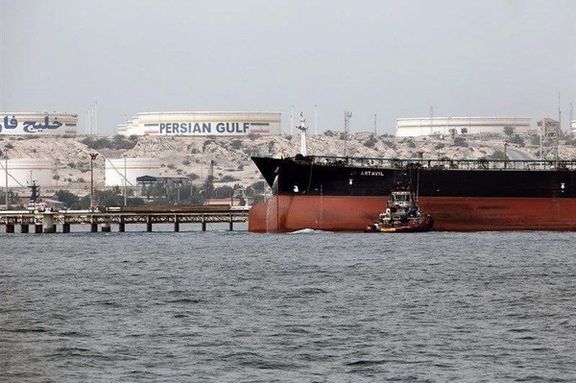
A third tanker carrying Iranian fuel for Hezbollah in Lebanon has reached the Syrian port city of Baniyas, TankerTrackers.com reported on Twitter on Wednesday.

A third tanker carrying Iranian fuel for Hezbollah in Lebanon has reached the Syrian port city of Baniyas, TankerTrackers.com reported on Twitter on Wednesday.
“FORTUNE (9283746) is the 3rd tanker to have reached Baniyas, Syria with gasoil for Hezb’Allah’s distribution in Lebanon. Also, in addition to Iranian crude oil, Baniyas has received a larger-than-usual delivery of Russian fuel. What’s unique is that it wasn’t for navy in Tartus,” TankerTrackers.com said.
The Iran-aligned Hezbollah movement says the shipments it is importing should ease a crippling energy crisis in Lebanon. Part of the shipment will be sold by Hezbollah according to local media. Fuel will also be distributed among hospitals and other essential service centers.
It is not clear how much of the oil has been transported to Lebanon by land. Thousands of trip by tanker trucks are required.
Lebanese Prime Minister Najib Mikati said last month the Iranian fuel shipments constitute a breach of Lebanon's sovereignty.
Both Syria and Iran are under US sanctions.
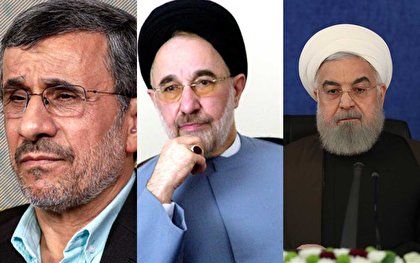
A prominent right-wing commentator in Iran has called the country's former presidents opposition figures and said that the regime should “twist their arms.”
Hassan Rahimpour Azghadi, an ultraconservative commentator who usually speaks on Iranian national television as a member of the Cultural Revolution Council, said in an interview with the right-wing Students News Network (SNN) that criticisms by former presidents of Iran are "non-constructive" and aimed at "toppling other political figures and replacing them."
Among former presidents only populist Mahmoud Ahmadinejad (2005-2013) has been vocal since 2017 when his candidacy for president was rejected by the Guardian Council, controlled by Supreme Leader Ali Khamenei. His successor Hassan Rouhani has disappeared from the scene after his term ended in early August, and Mohammad Khatami (1997-2005) has been forced into silence by the intelligence services. Even Khatami’s photos are banned from government-controlled media.
Hardliners loyal to Supreme Leader Ali Khamenei have been occasionally attacking former presidents for not being fully in synch with prevailing policies. They have been even running a campaign to prosecute Rouhani.
Aghzadi even named the deceased former deputy supreme leader Ayatollah Hossein Ali Montazeri and the Islamic Republic's first Prime Minister Mehdi Bazargan as opposition figures. What all these politicians had in common was open or indirect disagreement with the overarching power of the Supreme Leader in the Islamic Republic.
Azghadi further criticized the former presidents for questioning the validity of the Islamic Republic's Constitution once they left office. However, he failed to mention that Mohammad Khatami and Hassan Rouhani had spoken out even when they were in office.
Azghadi stressed that those former officials need to understand that what they criticize now is the outcome of their own political performance. Meanwhile he claimed that former officials should not act against the system as this is a political system that can be reformed through democratic means.
He made the statement mindless of the fact that the existence of the non-elected Guardian Council that handpicks election candidates based on their loyalty to the Supreme Leader is far from being democratic.
A commentary published by Iran's leading economic daily Donyaye Eqtesad tried to respond to hardliner rhetoric by observing that former presidents have always been complaining about the intervention of non-elected and institutions without executive responsibility in the affairs of their administration.
The daily pointed out that if former presidents sound like opposition figures, then tens of millions of voters who had voted for them in various rounds of elections are now part of the opposition.
Donyaye Eqtesad also pointed to the limitations imposed on Mohammad Khatami, saying that “his arm has already been twisted.” The daily also reminded that that two months after Hassan Rouhani left office, he was mentioned only once in the media with no derogatory comment when he sent a condolence message following the death of a top cleric.
The daily wrote that if anyone's arm is to be twisted, it is the arm of those, including Azghadi, who have been on the Cultural Revolution Council and have degraded Iranian universities to the level of high schools.
The commentary asked at the end whether Vice President for Economic Affairs Mohsen Rezaei, a former commander of the IRGC and a candidate in the presidential election, is also an opposition figure, because he said during televised debates that hardliners "have kicked so many revolutionary figures out of the train of the revolution that what has remained of the revolution is a scooter!"
The daily also asked referring to Azghadi’s opposition against all presidents since 1990: "If being an opposition figure is bad, why Azghadi himself has been an opposition figure for such a long time?"
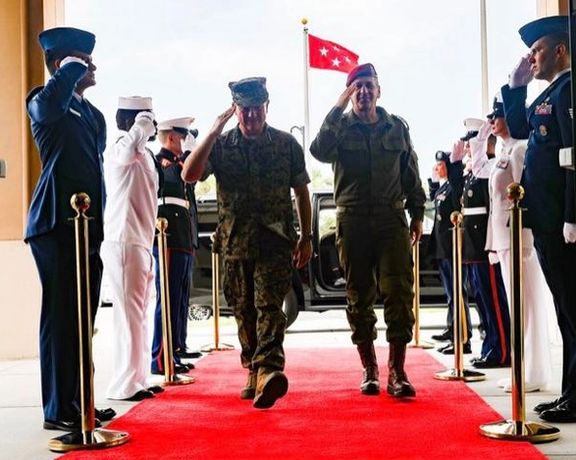
Israel's military chief on Tuesday vowed to step up actions, including covert operations, against Iran and its nuclear program.
Speaking in Tel Aviv, Lt. Gen. Aviv Kohavi said Israel and its intelligence community "is working against Iranian regional entrenchment throughout the Middle East."
"Operations to destroy Iranian capabilities will continue - in various arenas and at any time," he said during a ceremony in which the army appointed Maj. Gen. Aharon Haliva as its new intelligence chief.
"The operational plans against Iran's nuclear program will continue to evolve and improve," he added. "Whatever developments there may be, it is our duty to provide an effective and timely military response."
Israel considers Iran its greatest threat, citing its military presence in neighboring Syria, its support for hostile militant groups and its development of long-range missiles capable of striking Israel.
Israel accuses Iran of trying to develop a nuclear bomb — a charge Iran denies — and has vowed to prevent that from happening.
Israel has been suspected in a string of attacks on Iranian nuclear scientists and facilities over the past decade, but does not confirm or deny involvement.
Report by AP
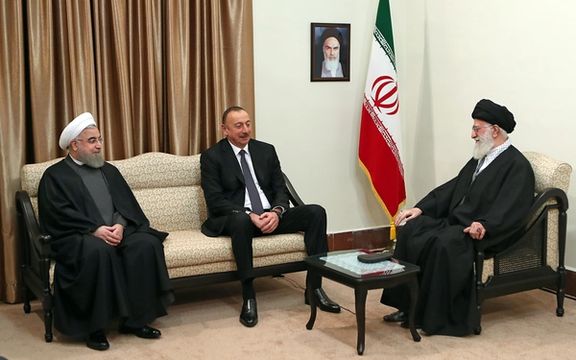
Tension between Iran and Azerbaijan heightened Tuesday as Baku shut down an Iranian mosque and Tehran barred Azerbaijani military flights over its territory.
Facing his first crisis in office, Hossein Amir-Abdollahian, Iran’s foreign minister who met his Armenian counterpart Ararat Mirzoyan in Tehran Monday, arrived in Moscow Tuesday. A joint news conference with Sergei Lavrov, Russia’s veteran foreign minister, is scheduled for Wednesday morning.
Kazem Jalali, Iran's ambassador to Moscow, said Wednesday that the meeting had gained importance with developments in the Caucasus and in Afghanistan. Azerbaijan, Turkey and Pakistan continued trilateral military drills dubbed “Indestructible Brotherhood 2021" in the NAR Tuesday near the Iran border.
Moscow brokered an uneasy agreement ending last year’s six-week war between Azerbaijan and Armenia, when the Azeris reclaimed the disputed enclave of Nagorno-Karabakh. The situation has since simmered, with occasional violence, and have centered of late on a stretch of road linking Iran and Armeniaoccupied by Azerbaijani troops.
Several Azerbaijani news agencies reported that Iran on Tuesday informed Azerbaijan that it had closed Iranian airspace to Azerbaijani aircraft carrying military supplies to the Azeri enclave ‘Nakhchivan Autonomous Republic,’ bordered by Armenia and by Iran to its south.
The move angered Baku, which called it an act dictated by Armenia. The defense ministry issued a statement calling the decision a betrayalthat led it to draw “unambiguous conclusions” about Iranian foreign policy.
The statement denied Iran’s move would “cause substantial harm to Azerbaijan.” Without access to Iranian airspace, Baku would need to supply the NAR by a roundabout route through Georgia and Turkey.
The Iranian Embassy in Baku in a statement Tuesday said Azerbaijani police inspected the Iranian mosque known as Iranian Husseiniya in Baku and shut it down.
Ehsan Zahidov,spokesman for the Azeri interior ministry, told the Qafqazinfo news-site that Covid infection had risen in recent days in several places in Baku, including the mosque. Zahidov said other places have been shut down for the same reason to allow preventative action.
The mosque is affiliated to the Iranian embassy and houses the office of Ali-Akbar Ojaghnejad, representative in Azerbaijan of Iranian leader Ali Khamenei. Ojaghnejad holds daily prayers at the mosque. The Iranian envoy, Seyed-Abbas Mousavi, later said that the closure had not affected Ojaghnejad’s work, which is conducted in the same building.
The Iranian embassy in Baku was attacked by Azerbaijani protesters last Thursday evening. Mousavi said Friday he had strongly protested over "disrespect and aggression” and that four perpetrators had been detained.

The Tehran chamber of commerce in a report has said that investments in the Iranian economy have steadily declined in the past decade, reaching negative growth.
The worst declines have been from March 2019 to March 2021, as US sanctions reduced the government’s ability to invest, and the private sector was weakened by a declining economy.
In the past Iranian year ending on March 20, investments totaled $4 billion that was less than capital depreciation, leading to a 4.8 percent negative rate of investments.
As assets, such as machinery and buildings, break down or fall into disrepair capital is needed to rejuvenate infrastructure. If new investments are less than what is needed for upkeep, the result is a negative rate of investments.
In the past decade in Iran investments in machinery declined by 7.3 percent and in buildings 4 percent.
The chamber of commerce calculated that if US sanctions are lifted now, Iran would need 13 years from to return to the rate of investments it had in 2011, if it can muster a 5 percent annual economic growth rate.
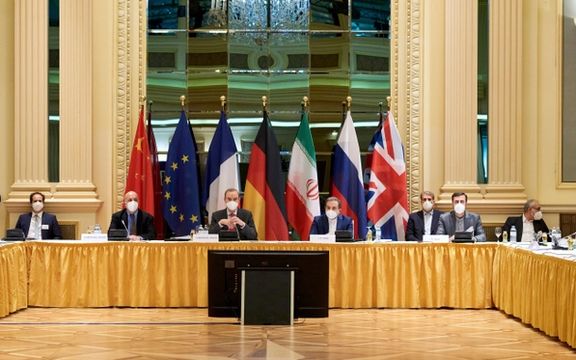
Western powers have been trying for weeks to get Tehran's answer to one question - when will it return to nuclear talks that have been on hold since June.
Iran's response has been a simple "soon", even at one point saying that 'soon' has a different connotation in Iran.
Behind Tehran's stalling is an attempt to gain leverage to extract more concessions when negotiations do eventually resume, officials and analysts said, including by advancing its uranium enrichment program, a possible pathway to a nuclear bomb.
Iran has long denied seeking to weaponize nuclear energy.
The talks, which aim to bring both Washington and Tehran back into compliance with a 2015 nuclear pact aimed at curbing the Iranian enrichment program, were adjourned in June after hardliner cleric Ebrahim Raisi was elected Iran's president.
"Iran will eventually return to the talks in Vienna. But we are in no rush to do so because time is on our side. Our nuclear advances further every day," a senior Iranian official said on condition of anonymity.
Ali Vaez, senior Iran analyst at the International Crisis Group, said "more time equals more leverage, given the exponential growth of Iran’s nuclear program".
While China and Russia, closer trading partners of Iran, are more restrained, Western parties to the pact can scarcely conceal their frustration. The United States and European powers have urged Iran to resume talks, saying the diplomatic window would not stay open forever as Tehran's nuclear program is advancing well beyond the limits set by the 2015 pact.
The nuclear agreement limited Iran’s uranium enrichment activity to make it harder for Tehran to develop nuclear arms, in return for lifting international sanctions.
But former U.S. President Donald Trump ditched the deal in 2018, saying it did not do enough to curb Iran’s nuclear activities, ballistic missile program and regional influence, and reimposed sanctions that have crippled Iran’s economy.
In response, Tehran breached the deal by rebuilding stockpiles of enriched uranium, refining it to higher fissile purity and installing advanced centrifuges to speed up output.
"They (Iran) keep saying they are going to come back to the table. But when they say soon ... it means absolutely nothing," said a senior European diplomat.
"That doesn't mean we think they don't want to come back, but we think they want their cake and to eat it. They want to create a fait accompli on the ground - technical and nuclear - and preserve the possibility of a negotiation."
MORE FOR LESS
Emboldened by the chaotic U.S. withdrawal from Afghanistan, Iran's rulers are confident their stalling strategy will not bring serious repercussions, analysts said, especially when U.S. President Joe Biden is embroiled in a growing rivalry with China and battling a COVID-19 crisis at home.
In contrast, the Biden administration is signaling that Iran should take nothing for granted.
Top US officials will tell visiting Israeli counterparts in Washington on Tuesday they are committed to diplomacy but would be prepared to pursue "other avenues" to ensure Tehran does not acquire a nuclear weapon, a senior U.S. official said.
Israel says it will not allow Tehran to get a nuclear bomb.
The man with ultimate authority in Iran, Supreme Leader Ayatollah Ali Khamenei, has blamed the United States for the pause in the talks.
"Ayatollah Khamenei seems to believe that by waiting, he can get a better deal from Washington. That time is on his side," said Meir Javedanfar, Iran lecturer at Israel's Reichman University.
Tehran and Washington still disagree on which steps need to be taken and when, with the key issues being what nuclear limits Tehran will accept and what sanctions Washington will remove.
The fact that indirect talks between Tehran and Washington paused after the election of Raisi was a sign of Tehran's plan "to press for major concessions" from the United States, said a former Iranian official.
"The establishment is also weighing different tactics to get more and give less in return. It takes time to determine their strategy," he said.
Naming Ali Bagheri Kani, an ardent critic of the 2015 pact, to replace former pragmatist chief nuclear negotiator Abbas Araghchi, signals Tehran will take an uncompromising approach when the talks resume, Eurasia Group analyst Henry Rome said.
ECONOMIC RISK
In addition to seeking the lifting of Trump-era sanctions in a verifiable process, Tehran also wants Washington to remove Iran's Revolutionary Guards from a terrorism blacklist. It also wants Europe to guarantee foreign investors will return, and assurances that Washington will not renege on the deal again.
For his part, Biden wants to restore the pact's nuclear limits and, if possible, extend them while pushing back against what he has called Iran's other destabilizing activities.
Sanam Vakil, deputy director of Chatham House’s Middle East and North Africa Program, said Iran would 'win' if it gained further concessions from Washington, but should the deal collapse Iran's rulers sense that they could survive through "maximum resistance", a reference to economic self-reliance.
However, Iran's foot-dragging strategy could weaken the country's clerical rulers by further hurting an economy already grappling with squeezed oil revenues.
The authorities fear a re-eruption of unrest among its core supporters lower-income Iranians - whose periodic bouts of protest in recent years reminded them how vulnerable they could be to popular anger over economic hardships.
"A failure to revive the nuclear deal entails real economic risk for Iran ... but politics trumps economics right now," Rome said.
Analysis by Parisa Hafezi and John Irish, Reuters